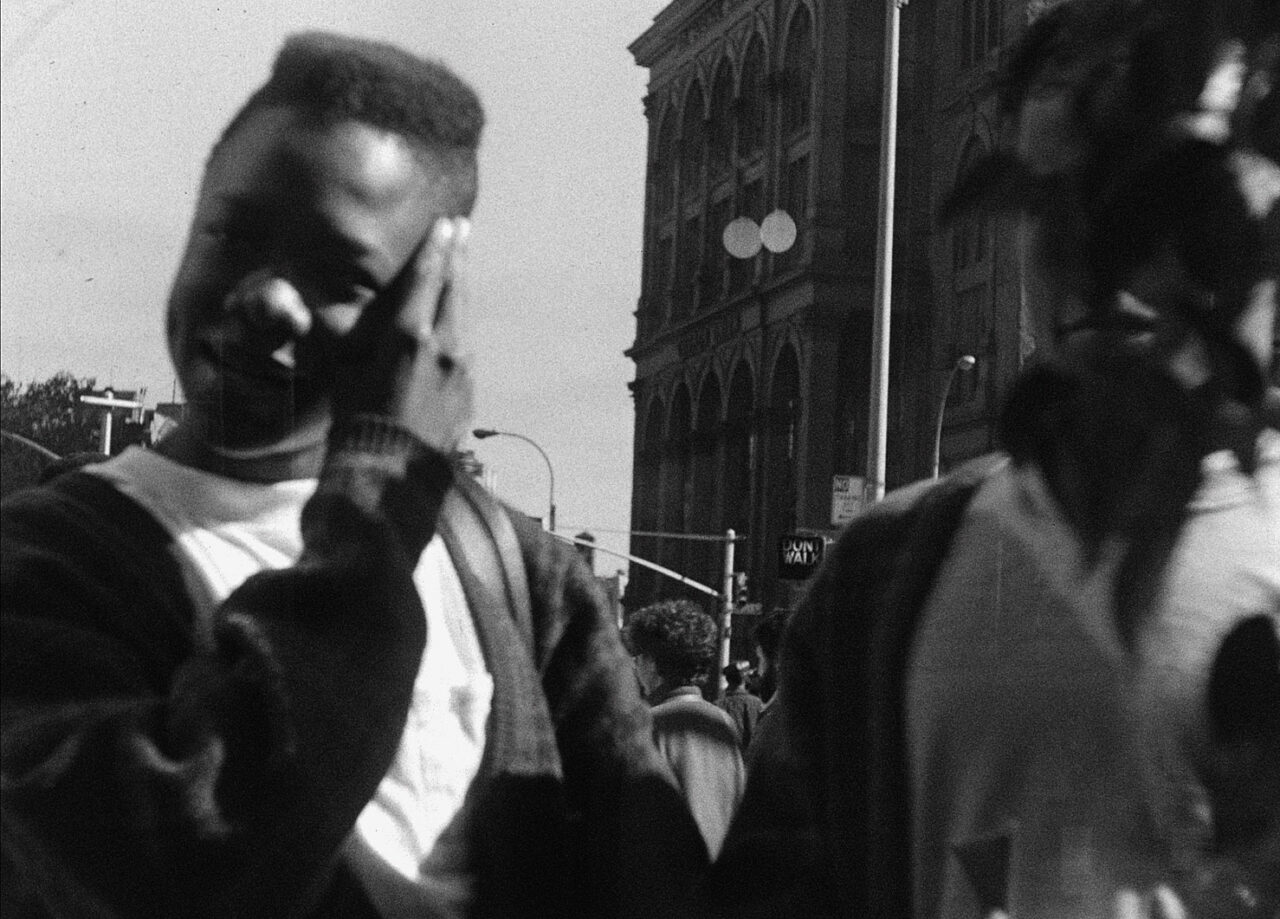Invoer 82549



stone or waterfall © Chloé Op de Beeck
We welcome Chloé Op de Beeck with a program curated around her new film stone or waterfall (2024).
A highlight will undoubtedly be the staging of Walking Dance for Any Number by American choreographer and filmmaker Elaine Summers (1925−2014). The original version with four simultaneous projections and live dancers has not been seen for many decades. We are bringing it back to mark the centennial of the dancer’s birth in collaboration with the Artistic Estate of Elaine Summers.
The two actors from stone or waterfall return as part of the program: Marita Schwanke as a dancer in Walking Dance for Any Number and Rien Schellemans with a film of his own, Ornitholagus Kino (2025).
→ Program: Chloé Op de Beeck & OFFoff coordinator Ruben Demasure
→ In the presence of Chloé Op de Beeck, Marita Schwanke and Rien Schellemans
→ Here, you can read a text by Alicja Melzacka on stone or waterfall
Four-channel projection with live dancers
On the occasion of the centennial year of Elaine Summers (1925−2014), Art Cinema OFFoff is honored to restage her 1969 Intermedia performance Walking Dance for Any Number in its original four-screen version with live dance for the first time.
With this work, the American choreographer and filmmaker Elaine Summers invites the audience to explore a basic element of dance: walking, and of film: black & white with no sound. The performance combines a simultaneous four-channel film projection of four different edits of the same footage, danced by Summers and filmed by Phill Niblock. A dance score instructs two to ten dancers in how they are allowed to walk, change their walk, and interact with each other. White workman-overalls worn by the dancers make them into moving canvases for the film projections, while their dance is an exploration of the myriads of ways in which one can walk, made into dance.
Dancers: Thomas Körtvélyessy, Marita Schwanke and Yuna Masson-Cariou

Walking Dance for Any Number © Artistic Estate of Elaine Summers
Shot by Babette Mangolte, the film explores the 1973 dance ‘Calico Mingling’, choreographed and performed by Lucinda Childs on New York’s Robert Moses Plaza at Fordham University, and the complex patterns created by the simple act of walking.
‘Calico Mingling’ is made of a series of trajectories of six walking steps, on a line or a semicircle, forwards or backwards. Each of the four dancers has forty repetitions of six steps, or a 240 count phrase each, with their own individual pattern in the space.
‘Calico Mingling’ was one of the first works that Lucinda Childs choreographed for her own dance company. During the 1960s, she had developed most of her pieces for the Judson Dance Theater, the group of which Elaine Summers was a founding member.

Calico Mingling © Arsenal, Babette Mangolte
Passersby at Astor Place in New York City speak silent volumes as they move by the mirrored surface of a diner window. I wanted to capture the unscripted choreography of the street, its dance of gazes and riddle of identities. This film is informed by the work of the Lumière brothers, with an eye to permeating an authority of the static camera and establishing a question as to who is watching whom. (Eve Heller)
16mm print: sixpackfilm

Astor Place © sixpackfim, Eve Heller
Am I the Ageless Object at the Museum? by the Palestinian artist Noor Abuarafeh is part of a long-term project that draws parallels between museums, zoos, and cemeteries as repositories for preservation and display. Viewers are led through zoos in Palestine, Switzerland, and Egypt, which, much like museums, conform to a standard in which animals are collected, caged, and subjected to an uneven power dynamic. Spliced with images of stuffed animals and pinned bugs from natural history museums, live animals are similarly made to appear like objects. Recounting childhood memories about zodiac signs, the evolution of hippos, the mythical symbology of whales, the narrator imagines themselves as a large cetacean, exposed to sunlight and nature, as if that body is also their own. (Madeline Weisburg, the Venice Biennale)

Am I the Ageless Object at the Museum? © Noor Abuarafeh
A woman and a man are walking through the city. Together they look at the environment and dwell on scenes they encounter along the way. The images of the environment mix with gestures and memories of past observations. stone or waterfall is a film about looking, language and representation, told through the choreography of two bodies in an urban environment.
“Being attentive to what the other pays attention to, leads to inventing together.”
– Yves Citton, The ecology of attention

stone or waterfall © Chloé Op de Beeck
In Philosophical Investigations (1953), Ludwig Wittgenstein discussed figures that can be seen and understood in two different ways. Often one can see something in a straightforward way – seeing that it is a rabbit, perhaps. But, at other times, one notices a particular aspect – seeing it as something. An example Wittgenstein uses is the “duck-rabbit”, an ambiguous image that can be seen as either a duck or a rabbit. This video is a first playful attempt at exploring the consequence of adding a new layer to this specific image: the aural, hearing. Transmitter and receiver are interdependent and exist in a cycle within the same image, from beak to ear.

Ornitholagus Kino © Rien Schellemans

